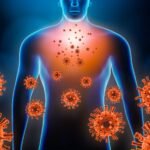Brain Health
We all need a clear mind and a sharp brain for our everyday life. Whether at school, in college or in our working life.
The brain needs a lot of energy to work well and master our existence.
For the brain to stay healthy for a long time, it needs the right nutrition.
How Does The Brain Work?
Everything that happens in the body is controlled by the brain. As the control center, it is responsible for all processes and functions of people and other living beings.
It consists of several 100 billion nerve cells that are connected to each other and transmit impulses.
In this way, they perceive external influences, process them, and are ultimately responsible for the appropriate reaction.
Nerve cells that are damaged or even defective cannot regenerate. It is therefore important to support the preservation of the cells.
All of these processes, including heartbeat and breathing, take place in the body unconsciously and do not require conscious control.
Instead, the brain takes on this task and at the same time ensures that all functions and reactions take place in the body.
The total volume of the brain consists of 80 percent of the cerebral cortex and is considered the central area of brain performance.
It is responsible for processing mental images and visual information.
It also enables people to speak and understand what is perceived. In addition to the cerebral cortex, the smaller brain areas such as the thalamus or hippocampus also play an important role.
Each area of the brain is responsible for special tasks to ensure additional functions such as mobility, awareness, sexuality, or sensory perception.
Overall, the brain consists of relatively few basic building blocks, which, however, have complex and variable functions.
In order for the brain to be able to use its full potential, it has a complex nervous system consisting of nerve cells.
All nerve cells communicate with each other and pass signals on to each other to activate a specific reaction.
Nutrients For The Brain
A conscious and balanced diet cares for the nerve cells and supports their function.
In addition to carbohydrates, proteins, and fats, certain micronutrients also play an important role in the performance of the brain.
Energy is required for the body’s control center to use its full potential.
The brain draws these mainly from carbohydrates, which the body breaks down into glucose.
Glucose
Glucose can be absorbed through different types of carbohydrates.
The simplest form is simple sugar, which the body can use directly from food as an energy source.
These include sugar, fruit, honey, or fruit juices. Double sugar, e.g. lactose in milk, on the other hand, consists of a short glucose chain that can be broken down quickly.
Short-chain carbohydrates like sweets are not suitable to support brain performance.
Long Glucose Chains
The longest glucose chains can be found in foods such as whole grains or legumes, which consist of multiple sugars.
The body needs more time to break the chain and provide the energy than for simple or double sugar.
Long-chain carbohydrates are particularly beneficial for the brain: they provide small amounts of energy over a longer period of time and make the brain efficient.
In order for the brain to have permanent energy, it needs complex carbohydrates.
The gut slowly breaks down long-chain carbohydrates and therefore releases smaller amounts of energy into the blood for a longer period of time.
Other Nutrients
At the same time, the nutrients in the diet provide protection and support for smooth communication between the brain and nerve cells.
The brain draws its energy not only from carbohydrates but also from proteins, fats, vitamins, and minerals.
But water also plays an important role in the brain.
Since nerve cells consist largely of water, the body must always be supplied with sufficient fluid.
Carbohydrates
The body stores carbohydrates in the form of glycogen and thus maintains the blood sugar level.
It also provides energy for the nerve tissue – including the brain.
Although they can be a quick booster of energy, they are not suitable in the long term.
Good sources are:
- oatmeal
- whole grains
- potatoes
- nuts
- lentils
- chickpeas
Protein
Proteins consist of many different amino acids – they serve as building materials for the cells.
In the brain, they also serve as a building material for important neurotransmitters that regulate memory, for example.
Amino acids control different metabolic processes in the form of enzymes or hormones.
For example, serotonin controls the sleep-wake rhythm, while norepinephrine influences learning ability and attention.
However, the body cannot produce all of the amino acids itself and is therefore dependent on food.
A combination of different protein sources is ideal for an optimal supply of amino acids.
Good sources are:
- soy flakes
- parmesan
- cheese
- beef
- lentils
- peanuts
Fat
The body protects itself from the cold by putting on love handles.
Similar protection takes place in the brain. To protect the brain and nerve cells, they are padded with adipose tissue.
Omega-3 fatty acids, which the body cannot produce itself, play a particularly important role among fats.
They regulate blood pressure, protect against cardiovascular diseases, and promote blood circulation in the blood vessels – especially in the brain.
Here around two-thirds of the fatty acids consist of omega-3. The essential fatty acid is contained especially in salmon, herring, mackerel, and some oils such as linseed oil or walnut oil.
Micronutrients
In addition to macronutrients, a balanced diet consists of micronutrients: vitamins, minerals, trace elements, and secondary plant substances.
Some of them have a significant impact on brain performance.
Vitamin C
Also known as ascorbic acid, the highest concentration of vitamin C is in the brain.
It is an important factor in the maturation and functioning of nerve cells.
At the same time, vitamin supports the reduction of stress factors in the brain – these are harmful oxygen compounds that result from the metabolic processes of the cells.
Too much of this oxidative stress can increase the risk of cancer and cardiovascular diseases or neurological diseases.
B Vitamins
There are a total of eight B vitamins that we ingest through food.
The effect of the vitamins is closely related to the maturation of the DNA and the supply of energy in the brain.
Vitamin B6 and vitamin B12 in particular play an important role.
However, one study shows that many people are undersupplied with these nutrients.
A lack of vitamin B6 manifests itself in a depressed mood, fatigue, and cramps and can be compensated for with the consumption of meat, fish, legumes, bananas, and nuts.
The deficiency symptoms of vitamin B12 show up in fluctuations in behavior and a reduced ability to think and concentrate.
Vitamin B12 is only found in animal products such as cheese.
Potassium
The mineral potassium influences the regulation of blood pressure.
A sufficient supply of potassium has a positive effect, especially in people with high blood pressure .
Potassium reduces the risk of a stroke or cardiovascular disease.
Potassium also regulates the pressure in the nerve cells in the brain.
In addition, the brain needs a sufficient supply of potassium to ensure the transmission of stimuli in the nervous system.
Selenium
The trace element selenium is vital for the brain.
It is involved in various functions of the control center: motor performance, coordination, and memory.
Sufficient intake is therefore important to ensure the functioning of the brain and nerve cells.
But the immune system and the thyroid also need selenium in order to function properly.
Recommended daily intake and suitable sources
|
Micronutrients |
man |
woman |
Food |
|
Vitamin C in mg / day |
110 mg |
95 mg |
Broccoli, red peppers, sea buckthorn, spinach, kale, fennel, black currant, parsley |
|
Vitamin B6 in mg / day |
1.6 mg |
1.4 mg |
Sesame seeds, turkey meat, hazelnuts, walnuts, pork sardines |
|
Vitamin B12 in µg / day |
4 µg |
4 µg |
Beef, eggs, milk, camembert, salmon |
|
Potassium in mg / day |
4000 mg |
4000 mg |
Avocado, mushrooms, dried fruit, green beans, tomatoes, raspberries, kiwi, rhubarb |
|
Selenium in µg / day |
70 µg |
60 µg |
Brazil nuts, white cabbage, mushrooms, asparagus, lentils, mackerel, herring |
Do Supplements Support My Brain?
Not always. Nutrition plays an essential role in brain performance, but the nutrients should not be overdosed.
Caution should be exercised especially with magnesium because an overdose can cause gastrointestinal complaints and have a strong influence on the function of the kidneys.
Therefore, you should always orient yourself to the recommended daily intake of nutrients and only supplement vitamins or minerals if necessary.
Foods That Decrease Brain Performance
Fast food, sweets or greasy dishes – all these foods should only be consumed in moderation for the sake of health.
Not only the organs but also the brain depend on a healthy and balanced diet in order to be fully functional.
Sugar acts like a drug in the brain
Whether in convenience foods or home-cooked dishes: sugar is an integral part of nutrition in today’s society.
It serves the brain as a quick source of energy.
However, studies show that consumption of sugary drinks, in particular, has increased in society.
They are linked to people’s worldwide weight gain and could be a major factor in diabetes – high sugar consumption can increase the risk of type 2 diabetes by 26 percent.
At the same time, sugar acts as a drug – a study examined the connection between sugar and the receptors in the brain.
It was shown that the receptors for sweet flavors accumulated in low-sugar environments and were not adapted to high sugar concentrations.
With a high-sugar diet, the receptors are activated and send a reward signal to the brain.
In doing so, they override the self-control mechanisms and generate a constant desire.
The researchers concluded that sugar works like cocaine and could even be addictive.
However, today there are alternative sweeteners such as thick juice, date syrup, or rice syrup.
Aspartame can limit brain performance
Many people use sweeteners as an alternative sugar – but there are sweeteners that can negatively affect the brain. This includes aspartame.
A study examined the effects of aspartame on the brain and its performance.
The subjects received food rich in aspartame for eight days.
The effect on cognitive performance, mood, and headache was examined.
After taking aspartame, the subjects had to do without it for two weeks until they again consumed foods with a low aspartame content for eight days.
It was shown that high aspartame consumption had a particularly negative effect on spatial orientation and mood – but not on memory.
After stopping the food, the brain performance of the affected areas improved again.
The researchers conclude that aspartame increases the likelihood of depressed mood and limits the brain’s capabilities.











